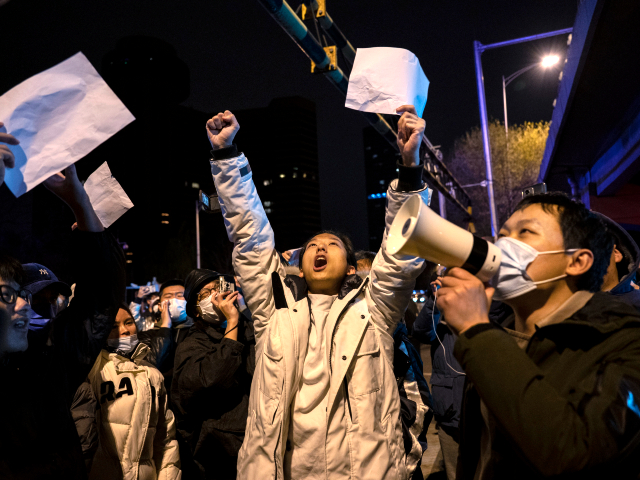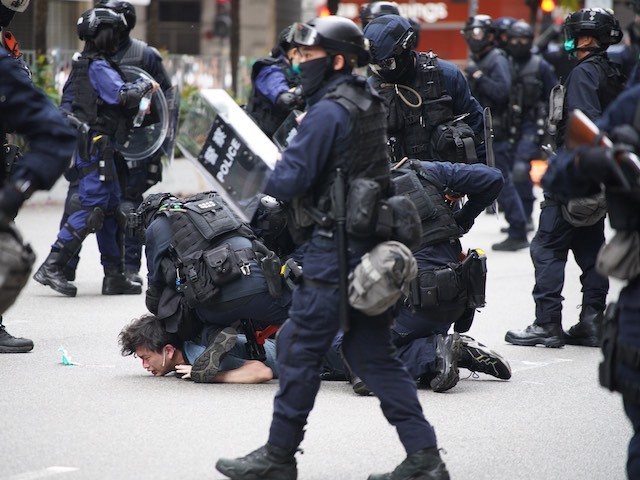The Chinese Communist government is ramping up online censorship ahead of the anniversary of the June 4, 1989, massacre of student demonstrators in Tiananmen Square – an event that is illegal to commemorate or discuss in China.
Beijing scrubs China’s heavily sealed, policed, and censored backwater of the Internet of Tiananmen content every year, but this time they, scrubbed a bridge right off the digital map. Users of China’s Baidu search engine – which, like Google and other search providers, has a mapping feature – suddenly found themselves unable to locate Sitong Bridge in Beijing. Early this week, Baidu began claiming “no related places found” when the bridge is searched for, although some intrepid users were able to get around the clumsy censorship by using different versions of the Chinese alphabet.
Sitong Bridge became a political topic last October when a man began hanging banners from the bridge criticizing dictator Xi Jinping and his heavy-handed coronavirus lockdown policies.
“No PCR tests, but food; no lockdowns, but freedom; no lies, but respect; no Cultural Revolution, but reform; no dictator, but vote; no [to being] slaves, but we the people,” one of the banners read.
The Sitong Bridge banners helped to inspire the massive nationwide protests that ultimately prompted Xi to abandon his lockdown policies, even though the Chinese government had long insisted the lockdowns were perfectly conceived, deftly executed, and highly effective at restraining the Wuhan coronavirus.
The protesters adopted white sheets of paper as a symbol of defiance, borrowing a (literal) page from the Hong Kong pro-democracy movement of 2019, which taunted the island’s Beijing-controlled government by daring the police to arrest them for waving papers that bore no message at all. Protesters waving blank paper assembled on other bridges as a tribute to the Sitong Bridge dissident, and they chanted a slogan from one of his banners: “Freedom, Not Lockdown.”

Protesters shout slogans during a protest against China’s strict zero COVID measures on November 28, 2022, in Beijing, China (Kevin Frayer/Getty Images).
The creator of the banners, saluted by admirers as “Bridge Man” for his courage – a name evocative of the fabled “Tank Man,” who stood alone against a line of Chinese tanks during the Tiananmen Square protests of 1989 – turned out to be a physicist named Peng Lifa. The Chinese tyranny went berserk, deleting every reference to his bridge protest from the Internet, and then they deleted him.
Peng was quickly arrested and made to disappear. His fate remains unknown. Others have been arrested merely for mentioning him online or for drawing pictures of him. In April, Time magazine named Peng one of its 100 Most Influential People of 2023.
“The character for ‘Si’ in ‘Sitong Bridge’ is the same as the character for four, making it especially sensitive. The anniversary has sometimes been called ‘internet maintenance day’ because of the number of websites that go offline,” the U.K. Guardian noted on Friday. Chinese censors frequently delete references to the number “64” because it can be taken as an allusion to June 4.
Last week, an activist named Chen Siming was arrested in Hunan province for refusing to delete a Twitter post about Tiananmen Square.
Hong Kong, formerly the epicenter of Tiananmen Square remembrance on Chinese soil, has been ruthlessly suppressed under a “national security law” imposed by Beijing in 2020 that criminalizes virtually all criticism of the government. References to Tiananmen Square are censored and punished as “sedition.” This has shifted the balance of Tiananmen commemorations to Taiwan, where many leaders of the 2019 pro-democracy movement in Hong Kong live in exile.

Police special tactical squad detain a protester (C) in Wanchai, Hong Kong, on May 24, 2020, as thousands of demonstrators took to the streets to protest against a national security law. The proposed legislation is expected to ban treason, subversion and sedition, and follows repeated warnings from Beijing that it will no longer tolerate dissent in Hong Kong, which was shaken by months of massive, sometimes violent anti-government protests last year (Photo by YAN ZHAO/AFP via Getty Images).
Elaine To, a Hong Kong democracy activist who now lives in Taiwan, told France 24 on Friday that her Internet activity is stalked by suspicious “followers” who could be agents or supporters of the Chinese government.
Activists living outside China fear such cyberstalking could be an effort to follow connections to friends and supporters who still live on the mainland. Some note the Chinese Communist Party is not without “influence” in Taiwan and might be able to take action against dissidents living there.
“I came to Taiwan and of course I met other Hong Kongers, some kind of political refugees themselves, but I felt sometimes although their bodies are physically free in Taiwan, their minds somehow are not totally free,” artist Kacey Wong observed.
“There is an invisible jail that is existing in everyone’s mind,” Wong said. “The Chinese Communist Party is building it inside the minds of exiles.”
China’s top Internet censorship agency, the Cyberspace Administration of China (CAC), held a symposium in Beijing on Wednesday to discuss “ways to better protect businesses from malicious online acts that damage reputations,” as the South China Morning Post (SCMP) put it.
At the symposium, CAC Deputy Director Niu Yibing pledged to create a “fast lane” for expediting corporate requests to censor online speech they feel is damaging to their reputations. The CAC will create a “dedicated online reporting channel” for such requests and will act more aggressively to ensure social media platforms and Internet providers carry out its censorship directives.
CAC published a statement that said it would “dish out harsh punishment on the leading accounts which publish malicious information to coerce [businesses] and severely crack down those who hire online trolls to slander and smear companies.”
The SCMP explained this is a reference to the growing practice of campaigning online against businesses and even releasing private information about Chinese business owners, for the purposes of extortion. The SCMP truculently noted that China’s crackdown on Big Tech, including the demolition of Internet mogul Jack Ma, generated a good deal of anti-business sentiment among the Chinese public for “online trolls” to exploit.
FLASHBACK — Exiled Hong Kong Activist Nathan Law: The CCP Is “Crushing Civil Society”
Kurt Zindulka / Breitbart News Breitbart





Comments are closed.